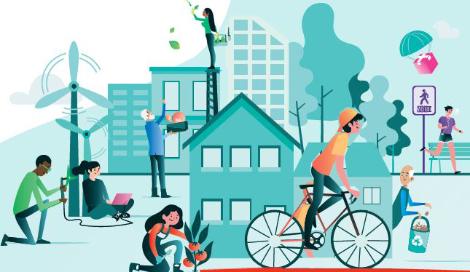Tomorrow my territory 07 Combining sustainable development and economic development
Local Development
November 2019
Agence pour l’Environnement et la Maîtrise de l’Energie (ADEME)
The 20 factsheets in the collection « demain MON TERRITOIRE » have been designed to give candidates and elected officials practical keys to take action, to open up the field of possibilities based on the experiences of other elected officials, from small towns to conurbations, large urban areas or sparsely populated areas. In the four corners of France, both in metropolitan France and in the French Overseas Territories, many of them are taking action, together with the players in their territories, to prepare for the future by taking action to mitigate climate change and adapt to its effects. With its knowledge and presence throughout the country, ADEME supports them with its tools, activities and financial aid.

Why is the ecological transition a lever for the economic development of my territory?
Communities have a responsibility to improve the environment and the living environment and play an essential role in local development. Making these two objectives converge means strengthening the economic attractiveness of the area, creating jobs that cannot be relocated and creating value for the inhabitants. Territories have several strings to their bow:
-
They can support companies by accompanying their social and environmental responsibility (SER) actions and reshaping more environmentally friendly business areas.
-
They can take part in the development of new « green » activities and sectors and focus on the social and solidarity economy (SSE).
-
They can initiate industrial ecology and circular economy projects.
How do you do it?
-
The network of actors working in contact with businesses (chambers of commerce and industry, chambers of trade and crafts, professional federations and associations) is associated with the climate, air and energy policy to be its enlightened ambassadors in the field and to be a source of initiatives and creativity in their own fields of activity.
-
We come in support of the craftsmen and traders, the economic lungs of the city. Their activity can be perpetuated by several actions: exemption from land charges, special measures in the local town planning plan, advertising of local products or know-how. The intervention fund for the safeguarding of crafts and trade (FISAC) is used to carry out operations. They are supported in their efforts to improve energy and environmental performance, by mobilising the consular chambers or the FAIRE network advisors, and by providing them with a referent facilitator.
-
Craftsmen are involved in the territory’s initiatives on waste reduction and energy saving by setting up competitions or consumer awareness campaigns. In this way, exchanges between consumers and traders in the same area are strengthened. Messages addressed to citizens and consumers are adapted to communications addressed to professionals.
-
Public order is a powerful vector. One rethinks one’s needs, thinks about their sustainability and their overall cost. Care is taken to give a place to integration structures through economic activity by reserving a lot for them when a contract is awarded. Certain services are subcontracted to them.
-
We make common cause with social and solidarity economy actors to create new activities that meet the needs of citizens while promoting integration and social ties: low-cost car rental, repair workshops, equipment loans, market gardening…
-
It is part of existing integration schemes, such as the « Territoire zéro chômeur longue durée » (Territory of zero long-term unemployment) experiment. It helps to stimulate the skills development of changing professions, such as those in the building industry. We plan for the future, with prospective studies that take into account economic data on environmental issues in the employment area; tools such as the « employment and sustainable development centres » help to structure a development policy based on an inventory of the current situation.